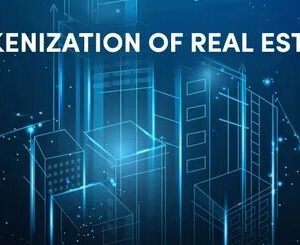
Outline:
1. Introduction
- Overview of blockchain technology and its application in real estate
- The potential of blockchain to revolutionize property transactions and ownership
- The Role of Blockchain in Real Estate
2: What is Blockchain and How Does it Work?
- Basic introduction to blockchain technology
- How blockchain operates through decentralized ledgers
- Why blockchain is a game-changer for real estate transactions
3: The Need for Transparency in Real Estate Transactions
- Current challenges in real estate transactions (e.g., fraud, inefficiency)
- How blockchain improves transparency in real estate
- Reducing fraud and increasing trust with blockchain technology
4: Blockchain’s Impact on Real Estate Transactions
- Streamlining property sales with smart contracts
- The role of blockchain in reducing middlemen and transaction costs
- Examples of blockchain-based real estate platforms
5: The Future of Real Estate Transactions with Blockchain
- Predictions for blockchain adoption in the real estate sector
- How blockchain will transform future real estate deals
- The potential for cross-border transactions using blockchain
6: Blockchain and Property Ownership: A New Paradigm
- How blockchain simplifies property title management
- The process of transferring ownership through blockchain
- Potential for tokenizing property ownership using blockchain
7: Tokenization of Real Estate: The Future of Property Investment
- What is tokenization and how it works in real estate
- The advantages of tokenizing real estate assets
- How tokenization increases accessibility for small investors
8: Real Estate Investment through Blockchain and Tokens
- The rise of Real Estate Investment Trusts (REITs) powered by blockchain
- Decentralized finance (DeFi) and its role in real estate investing
- Blockchain-based crowdfunding platforms for real estate projects
9: Enhancing Transparency and Efficiency in Property Records
- How blockchain eliminates the need for paper-based records
- Reducing errors and delays in property title transfers
- The role of blockchain in maintaining immutable property records
10: The Impact of Blockchain on Property Valuations
- How blockchain data can improve property valuations
- The use of real-time data for accurate property assessments
- Examples of blockchain-powered property valuation platforms
11: Smart Contracts and Their Role in Real Estate Deals
- How smart contracts work in real estate transactions
- Ensuring security, efficiency, and automation in property deals
- Real-life examples of smart contracts in action
12: Blockchain’s Role in the Global Real Estate Market
- The potential of blockchain in facilitating international property transactions
- Cross-border real estate transactions made easier through blockchain
- Blockchain’s ability to overcome barriers like currency exchange and local laws
13: Blockchain and Regulatory Challenges in Real Estate
- Legal and regulatory considerations for blockchain-based real estate deals
- How governments are adapting to blockchain’s role in real estate
- The future of regulatory frameworks for blockchain in real estate
14: How Blockchain Enhances Security in Real Estate Deals
- Protecting buyer and seller information with blockchain’s encryption
- Reducing the risk of cyber attacks in property transactions
- Blockchain’s role in secure document verification
15: Case Studies of Blockchain in Real Estate
- Successful real estate projects utilizing blockchain technology
- Real-world examples of blockchain integration in property transactions
- Lessons learned from early blockchain adoption in real estate
16: Blockchain-Powered Real Estate Platforms
- Introduction to blockchain-based real estate platforms (e.g., Propy, RealT)
- The benefits of using these platforms for property sales and management
- How blockchain platforms increase efficiency and reduce costs for all parties
17: The Potential for Blockchain to Disrupt the Traditional Real Estate Industry
- How blockchain challenges traditional real estate processes
- The evolving role of real estate agents in a blockchain-driven market
- The long-term impact of blockchain on the industry as a whole
18: Conclusion
- Recap of blockchain’s role in revolutionizing real estate
- How blockchain enhances transparency, reduces costs, and simplifies transactions
- Final thoughts on the future of blockchain in the real estate industry
FAQs
- How does blockchain improve the transparency of real estate transactions?
- What is tokenization, and how does it work in real estate?
- How can blockchain reduce the costs associated with traditional real estate transactions?
- What are the advantages of using smart contracts in real estate deals?
- How does blockchain technology impact property ownership and title management?
READ MORE: The Rise of Co-Living Spaces: How Shared Real Estate Models Are Redefining Urban Housing Dynamics
The Role of Blockchain in Real Estate: Revolutionizing Transactions, Ownership, and Transparency for a Future-Free from Fraud
Introduction
The role of blockchain in real estate is steadily growing as the industry adapts to the possibilities this technology offers. Blockchain, the decentralized and secure digital ledger system, has the potential to revolutionize the way property transactions are conducted, how ownership is recorded, and how transparency is maintained in the real estate sector. As we move toward a more digital and interconnected world, blockchain is emerging as a transformative tool that can enhance efficiency, reduce fraud, and create a more transparent and streamlined process for buying, selling, and managing real estate.
In this article, we will explore how blockchain technology is reshaping the real estate industry, from simplifying transactions with smart contracts to enabling property ownership through tokenization. We’ll also dive into how blockchain can improve transparency, increase security, and offer greater access to real estate investments, making it one of the most significant innovations in the industry.
What is Blockchain and How Does it Work?
At its core, blockchain technology is a decentralized digital ledger system that records transactions across a network of computers. Each block in the chain contains a set of transaction data that is secured with encryption, ensuring that once information is recorded, it cannot be altered or deleted. This creates a highly secure and transparent method of recording data.
In the real estate industry, blockchain enables secure and transparent transactions by ensuring that all property data—from ownership records to transaction history—is available and immutable. This technology eliminates the need for middlemen such as brokers, lawyers, or notaries, reducing the time and costs associated with property transactions.
How Blockchain Operates Through Decentralized Ledgers
Blockchain’s decentralized ledger means that no single entity controls the data; instead, it is distributed across a network of computers, or nodes. Each participant in the network has access to the same information, creating a transparent, tamper-proof record of all transactions. This system ensures that every transaction is verified and validated by multiple parties, making blockchain an ideal tool for real estate transactions that require transparency and accountability.
Why Blockchain is a Game-Changer for Real Estate Transactions
Blockchain offers several key advantages for real estate transactions, including:
- Efficiency: Reduces the time it takes to close deals by automating key steps in the process, such as document verification and payment processing.
- Transparency: Ensures that all property records are visible to all relevant parties, reducing the risk of fraud and increasing trust.
- Security: The encrypted nature of blockchain ensures that transactions are secure and private, reducing the risk of cyber attacks and data breaches.
The Need for Transparency in Real Estate Transactions
Real estate transactions are historically prone to fraud, inefficiency, and a lack of transparency. Whether it’s forged documents, hidden ownership information, or lengthy processing times, these issues often create hurdles for buyers, sellers, and investors. Blockchain technology solves many of these problems by offering a system where all property-related data is recorded on a transparent, immutable ledger that is accessible to all stakeholders.
Current Challenges in Real Estate Transactions
Traditional real estate transactions often involve multiple parties, such as agents, lawyers, notaries, and banks, each of whom must verify and validate various aspects of the deal. This process can be slow, costly, and prone to errors. Additionally, fraud is a common issue in the real estate market, with fake deeds, undisclosed ownership, and misrepresentation of property details often complicating deals.
How Blockchain Improves Transparency in Real Estate
Blockchain enhances transaction transparency by recording every step of the real estate process on a public ledger that is accessible to all parties involved. This reduces the risk of fraud and errors, as all data is visible, verified, and immutable. Furthermore, blockchain allows for smart contracts, which automatically execute actions when certain conditions are met, streamlining the process and reducing human intervention.
Reducing Fraud and Increasing Trust with Blockchain Technology
By providing a secure and transparent record of ownership and transaction history, blockchain significantly reduces the possibility of fraud. Each property’s ownership and transaction data are stored in an unchangeable format, ensuring that buyers and sellers can verify the legitimacy of a property before making any commitments. This increased trust is one of the key benefits of blockchain technology in luxury real estate transactions.
Blockchain’s Impact on Real Estate Transactions
Blockchain is streamlining the entire process of real estate transactions, from property sales to lease agreements and beyond. One of the most significant applications of blockchain in real estate is the use of smart contracts, which automate and simplify the transaction process.
Streamlining Property Sales with Smart Contracts
Smart contracts are self-executing contracts where the terms of the agreement are directly written into code. In the real estate context, smart contracts automatically execute actions like transferring ownership or releasing payment once the terms of the agreement are met. This removes the need for intermediaries, speeds up transactions, and reduces the risk of human error.
The Role of Blockchain in Reducing Middlemen and Transaction Costs
By removing the need for intermediaries like real estate agents, lawyers, or notaries, blockchain significantly reduces transaction costs. Blockchain-powered platforms can offer a more direct route between buyers and sellers, eliminating commission fees and reducing the overall cost of a real estate transaction.
Examples of Blockchain-Based Real Estate Platforms
Several real estate platforms are already using blockchain to streamline property transactions. For example, Propy is a blockchain-based platform that allows users to buy and sell property using cryptocurrency and smart contracts. This platform reduces the time and complexity of the buying process by enabling property transactions to take place entirely online, without the need for physical paperwork or intermediaries.
Blockchain and Property Ownership: A New Paradigm
Blockchain is also revolutionizing how property ownership is recorded and transferred. Traditionally, ownership records are maintained in government databases, which can be inefficient, prone to errors, and vulnerable to fraud. Blockchain offers a more secure, transparent, and efficient way to manage property titles and ownership records.
How Blockchain Simplifies Property Title Management
Using blockchain, property titles can be recorded as digital assets on the blockchain, making them accessible and verifiable at any time. This digital ownership record is immutable, meaning that once a title is recorded, it cannot be changed or forged. This simplifies the process of verifying ownership and reduces the time spent in title searches.
The Process of Transferring Ownership Through Blockchain
When a property is sold, blockchain allows the transaction to be recorded in a transparent ledger, which can then be updated in real-time. This makes it easier to transfer ownership, as all parties involved have access to the same verified data. Additionally, blockchain can automate the transfer process through smart contracts, ensuring that once all conditions are met, ownership is seamlessly transferred.
Potential for Tokenizing Property Ownership Using Blockchain
Tokenization is the process of converting property ownership into digital tokens that can be traded or sold. Each token represents a fractional ownership share of a property, allowing investors to buy and sell portions of real estate. This opens up property investment to a larger audience, allowing small investors to own a share of luxury properties and giving them access to markets that were previously out of reach.
The Future of Blockchain in Real Estate
As blockchain technology continues to mature, its role in real estate will only grow stronger. In the future, blockchain could facilitate cross-border property transactions, enable virtual real estate purchases in the metaverse, and provide greater accessibility to real estate investments.
Predictions for Blockchain Adoption in the Real Estate Sector
It’s expected that by 2025, blockchain will be fully integrated into the mainstream real estate market. From managing property titles to enabling cross-border transactions and increasing transparency in deal-making, blockchain will be an essential tool in modern real estate development.
How Blockchain Will Transform Future Real Estate Deals
The future of real estate transactions will likely involve full digitalization. Blockchain’s ability to secure property records, enable smart contracts, and facilitate tokenization will streamline the buying process, reduce costs, and expand the global reach of real estate markets.
The Potential for Cross-Border Transactions Using Blockchain
With blockchain, buyers and sellers from different countries can engage in property transactions without the need for complex currency exchanges or lengthy legal processes. This opens up the possibility of international real estate transactions becoming quicker, safer, and more efficient.
READ MORE: Propy: Blockchain-Powered Real Estate Transactions
FAQs
- How does blockchain improve the transparency of real estate transactions?
Blockchain improves transparency in real estate transactions by providing an immutable and decentralized ledger of all property-related data. Every transaction, from property sales to title transfers, is recorded on the blockchain, ensuring that all parties have access to the same verified and transparent information. This transparency helps prevent fraud, errors, and disputes, making the entire process more trustworthy and reliable. - What is tokenization, and how does it work in real estate?
Tokenization is the process of converting property ownership into digital tokens that represent fractional ownership of a property. These tokens can be traded, bought, or sold, allowing individuals to invest in real estate without having to buy an entire property. Tokenization opens up real estate investment to a larger audience, offering liquidity and enabling investors to buy smaller portions of high-value properties that were previously out of reach. - How can blockchain reduce the costs associated with traditional real estate transactions?
Blockchain reduces costs in real estate transactions by eliminating intermediaries such as brokers, lawyers, and notaries. With blockchain, smart contracts automate various processes, reducing the need for manual intervention. This cuts down on transaction fees, legal costs, and administrative overhead. Additionally, blockchain streamlines the property title transfer process, reducing paperwork, errors, and delays, all of which help lower transaction costs. - What are the advantages of using smart contracts in real estate deals?
Smart contracts in real estate automate and enforce the terms of an agreement without needing a middleman. These self-executing contracts ensure that property transactions are carried out when predefined conditions are met (such as the transfer of funds or documents). The advantages include reduced risk of human error, faster processing times, cost savings by eliminating intermediaries, and greater security through cryptographic verification of all contract terms. - How does blockchain technology impact property ownership and title management?
Blockchain revolutionizes property ownership and title management by offering a digital, immutable ledger for property titles. This system provides a secure, transparent, and easily accessible record of property ownership that is resistant to tampering or fraud. By digitizing property titles on blockchain, the process of transferring ownership becomes faster, more accurate, and more secure. It also eliminates the need for paper-based records, reducing errors and delays in title transfers.








